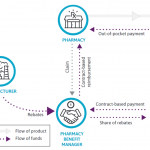Children and young people’s (CYP) mental health is a top priority for the NHS, with recent data suggesting that 18% of children aged 7-16 may have a probable mental disorder (NHS Digital, 2022). To address this growing demand for CYP mental health services, researchers have developed and tested evidence-based practices (EBP) that are grounded in scientific evidence (Hoagwood et al., 2017). While research trials have shown promising results for EBPs, the translation of these findings into actual practice is often a challenge (Bear et al., 2020).
One potential solution to improve the uptake of EBPs is to utilize implementation science to understand the implementation process better, identifying barriers and facilitators to implementation (Finley et al, 2018). Peters-Corbett et al. (2023) conducted a study using the integrated Promoting Action on Research Implementation in Health Services (i-PARIHS) framework to identify and synthesize the barriers and facilitators to implementing EBPs in CYP mental health care and provide recommendations for clinicians and researchers.
Rates of children and young people with probable mental health disorders have been steadily increasing, leading to a higher demand for support. Despite promising research, there is a gap in implementing findings within practice. The authors conducted a systematic review across four databases to identify relevant research on the barriers and facilitators of implementing EBPs in CYP mental health. The study included 26 papers, with the majority of studies conducted in the USA.
Barriers to implementation included lack of resources, high service demands, and clinician resistance to change, while facilitators included access to resources, leadership support, and clinician openness to change. This review provides key insights to help bridge the gap between research and practice in CYP mental health services.
The review identified several implications for practice, including the need for prioritizing the implementation process beyond research trials and sharing case studies of successful EBP implementation. Policy recommendations include ring-fencing funding for implementation in CYP mental health services and prioritizing implementation outcomes alongside effectiveness outcomes.
In conclusion, this review highlights the importance of understanding and addressing barriers and facilitators to implementing EBPs in CYP mental health care to provide evidence-based care to children and young people. Collaboration between researchers, clinicians, policymakers, and stakeholders is essential to improve the implementation of EBPs in CYP mental health services.






